This view of the Owner's Manual contains the very latest information, which may vary slightly from the printed Owner's Manual originally provided with your vehicle. It may also describe content that is not on or operates differently on your vehicle. Please consider the Owner's Manual originally provided with your vehicle as the primary source of information for your vehicle.

The information contained in this publication was correct at the time of release.In the interest of continuous development, we reserve the right to change specifications, design or equipment at any time without notice or obligation.No part of this publication may be reproduced, transmitted, stored in a retrieval system or translated into any language in any form by any means without our written permission.Errors and omissions excepted.
Copyright © 2024 Ford Motor Company
Changing a Road Wheel

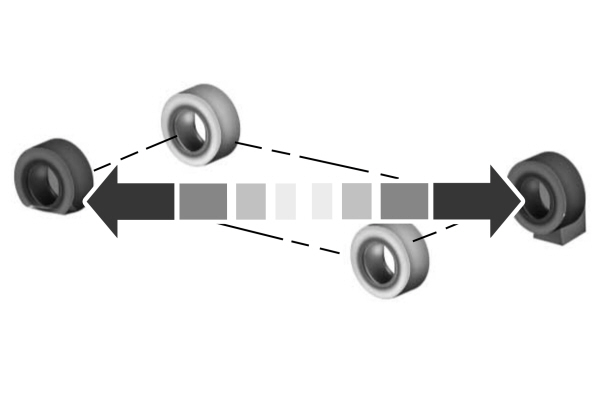
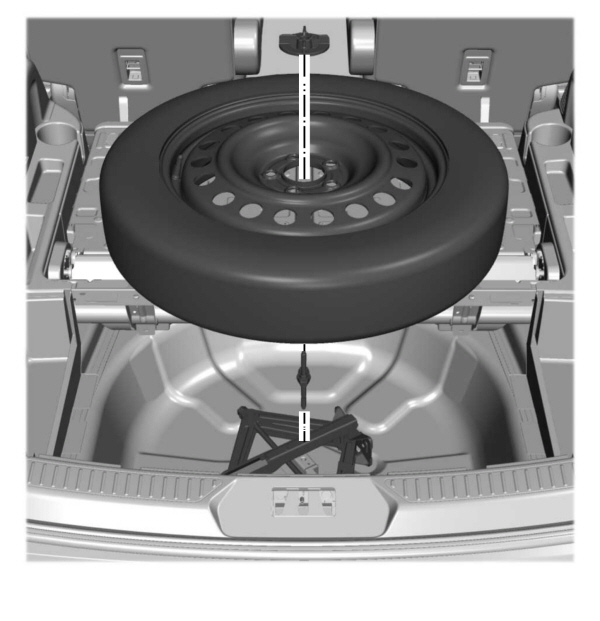


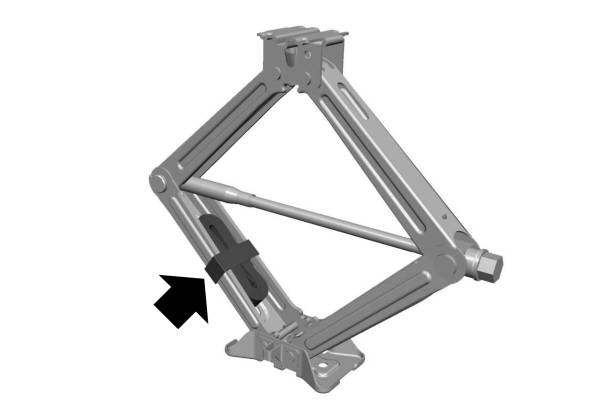
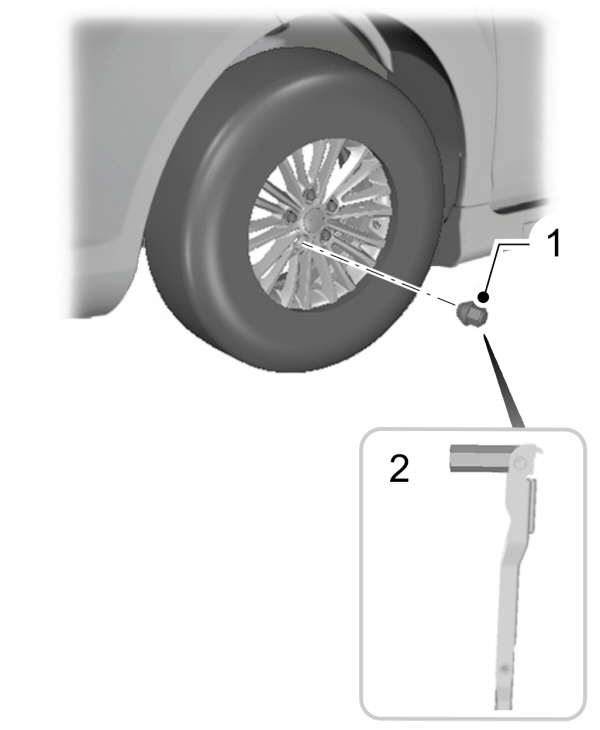
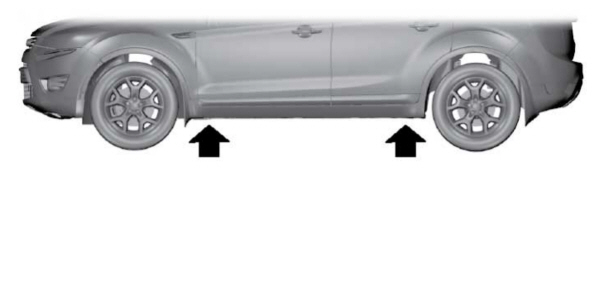
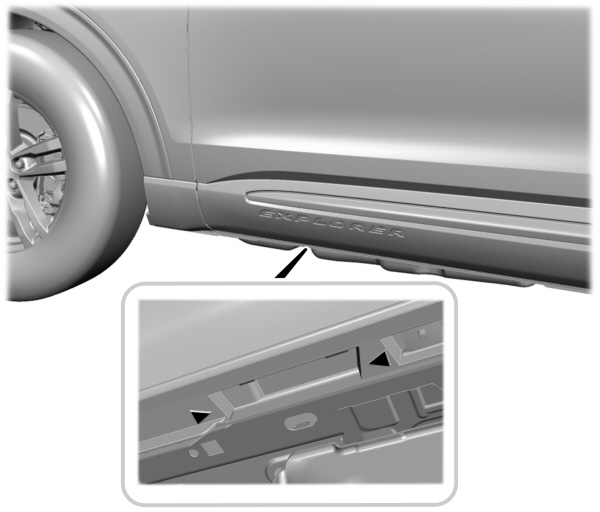
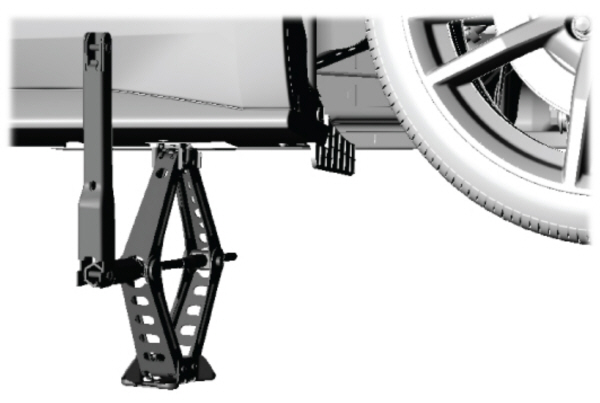
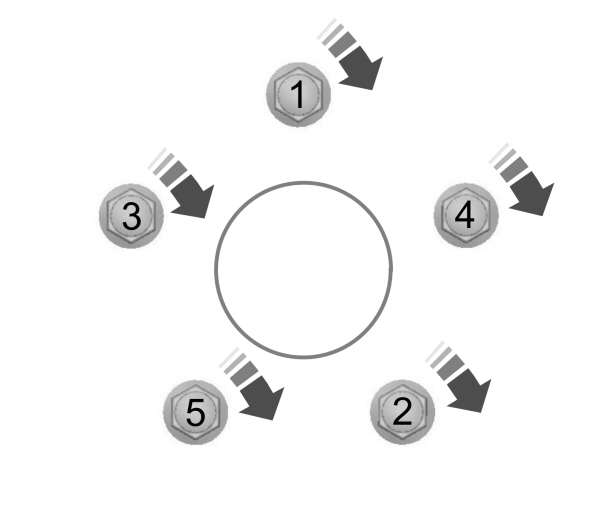
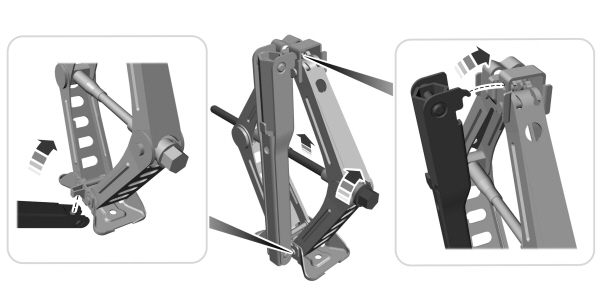
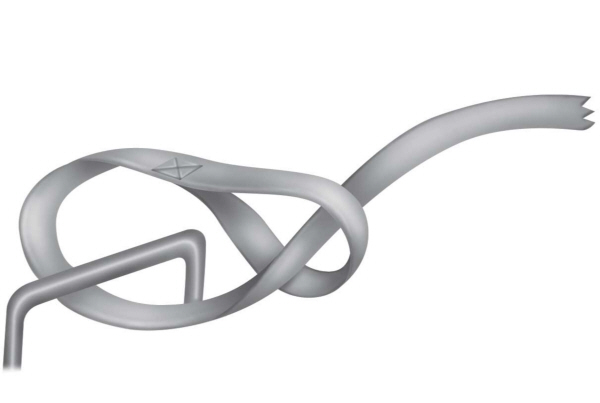


 WARNING:
If the tire pressure monitor sensor becomes damaged it may not function.
WARNING:
If the tire pressure monitor sensor becomes damaged it may not function. |
Note:
You should only use tire sealants in roadside emergencies as they may cause damage to the tire pressure monitoring system sensor.
Note:
The tire pressure monitoring system indicator light illuminates when the spare tire is in use. To restore the full function of the monitoring system, all road wheels equipped with tire pressure monitoring sensors must be mounted on the vehicle.
If you get a flat tire when driving, do not apply the brake heavily. Instead, gradually decrease your speed. Hold the steering wheel firmly and slowly move to a safe place on the side of the road.
Have a flat serviced by an authorized dealer in order to prevent damage to the tire pressure monitoring system sensors. See
Tire Pressure Monitoring System.
Replace the spare tire with a road tire as soon as possible. During repairing or replacing of the flat tire, have the authorized dealer inspect the tire pressure monitoring system sensor for damage.
Dissimilar Spare Wheel and Tire Assembly Information
 WARNING:
Failure to follow these guidelines could result in an increased risk of loss of vehicle control, injury or death.
WARNING:
Failure to follow these guidelines could result in an increased risk of loss of vehicle control, injury or death. |
If you have a dissimilar spare wheel and tire, then it is intended for temporary use only. This means that if you need to use it, you should replace it as soon as possible with a road wheel and tire assembly that is the same size and type as the road tires and wheels that were originally provided by us. If the dissimilar spare tire or wheel is damaged, you should replace it rather than repair it.
A dissimilar spare wheel and tire assembly is defined as a spare wheel and tire assembly that is different in brand, size or appearance from the road tires and wheels and can be one of three types:
1. T-type mini-spare: This spare tire begins with the letter T for tire size and may have Temporary Use Only molded in the sidewall.
2. Full-size dissimilar spare with label on wheel: This spare tire has a label on the wheel that states: THIS WHEEL AND TIRE ASSEMBLY FOR TEMPORARY USE ONLY.
When driving with one of the dissimilar spare tires listed above, do not:
- Exceed 50 mph (80 km/h).
- Load the vehicle beyond maximum vehicle load rating listed on the Safety Compliance Label.
- Tow a trailer.
- Use snow chains on the end of the vehicle with the dissimilar spare tire.
- Use more than one dissimilar spare tire at a time.
- Use commercial car washing equipment.
- Try to repair the dissimilar spare tire.
- Handling, stability and braking performance.
- Comfort and noise.
- Ground clearance and parking at curbs.
- Winter weather driving capability.
- Wet weather driving capability.
- Four-wheel driving capability.
3. Full-size dissimilar spare without label on wheel.
When driving with the full-size dissimilar spare wheel and tire assembly, do not: - Exceed 70 mph (113 km/h).
- Use more than one dissimilar spare wheel and tire assembly at a time.
- Use commercial car washing equipment.
- Use snow chains on the end of the vehicle with the dissimilar spare wheel and tire assembly.
- Handling, stability and braking performance.
- Comfort and noise.
- Ground clearance and parking at curbs.
- Winter weather driving capability.
- Wet weather driving capability.
- Four-wheel driving capability.
- Towing a trailer.
- Driving vehicles equipped with a camper body.
- Driving vehicles with a load on the cargo rack.
Drive cautiously when using a full-size dissimilar spare wheel and tire assembly and seek service as soon as possible.
Tire Change Procedure
 WARNING:
The jack supplied with this vehicle is only intended for changing wheels. Do not use the vehicle jack other than when you are changing a wheel in an emergency.
WARNING:
The jack supplied with this vehicle is only intended for changing wheels. Do not use the vehicle jack other than when you are changing a wheel in an emergency. WARNING:
Check that the vehicle jack is not damaged or deformed and the thread is lubricated and clean.
WARNING:
Check that the vehicle jack is not damaged or deformed and the thread is lubricated and clean. WARNING:
To help prevent your vehicle from moving when changing a wheel, shift the transmission into park (P), set the parking brake and use an appropriate block or wheel chock to secure the wheel diagonally opposite to the wheel being changed. For example, when changing the front left wheel, place an appropriate block or wheel chock on the right rear wheel.
WARNING:
To help prevent your vehicle from moving when changing a wheel, shift the transmission into park (P), set the parking brake and use an appropriate block or wheel chock to secure the wheel diagonally opposite to the wheel being changed. For example, when changing the front left wheel, place an appropriate block or wheel chock on the right rear wheel. WARNING:
Always use the jack provided as original equipment with your vehicle. If using a jack other than the one provided, make sure the jack capacity is adequate for the vehicle weight, including any vehicle cargo or modifications. If you are unsure if the jack capacity is adequate, contact the authorized dealer.
WARNING:
Always use the jack provided as original equipment with your vehicle. If using a jack other than the one provided, make sure the jack capacity is adequate for the vehicle weight, including any vehicle cargo or modifications. If you are unsure if the jack capacity is adequate, contact the authorized dealer. WARNING:
Do not work on your vehicle when the jack is the only support as your vehicle could slip off the jack. Failure to follow this instruction could result in personal injury or death.
WARNING:
Do not work on your vehicle when the jack is the only support as your vehicle could slip off the jack. Failure to follow this instruction could result in personal injury or death. WARNING:
Use only the specified jacking points. If you use other positions, you may damage the body, steering, suspension, engine, braking system or the fuel lines.
WARNING:
Use only the specified jacking points. If you use other positions, you may damage the body, steering, suspension, engine, braking system or the fuel lines. WARNING:
Never place anything between the vehicle jack and your vehicle.
WARNING:
Never place anything between the vehicle jack and your vehicle. WARNING:
Never place anything between the vehicle jack and the ground.
WARNING:
Never place anything between the vehicle jack and the ground. WARNING:
Park your vehicle so that you do not obstruct the flow of traffic or place yourself in any danger and set up a warning triangle.
WARNING:
Park your vehicle so that you do not obstruct the flow of traffic or place yourself in any danger and set up a warning triangle. WARNING:
Do not attempt to change a tire on the side of the vehicle close to moving traffic. Pull far enough off the road to avoid the danger of being hit when operating the jack or changing the wheel.
WARNING:
Do not attempt to change a tire on the side of the vehicle close to moving traffic. Pull far enough off the road to avoid the danger of being hit when operating the jack or changing the wheel. |
Note:
Passengers should not remain in your vehicle when the vehicle is being jacked.
Note:
Jack at the specified locations to avoid damage to the vehicle.

Note:
No maintenance or additional lubrication of your jack is required over the service life of your vehicle.
- Park on a level surface, set the parking brake and switch on the hazard flashers.
- Apply the parking brake, place the transmission in park (P) or reverse (R) for manual transmission. Turn the engine off.
- If your vehicle has air suspension, use the touch screen to switch on the Air Suspension Service Mode prior to jacking.

- Block the wheel diagonally opposite the flat tire. For example, if the left front tire is flat, block the right rear wheel.

- Unfold the third row seat if it is in the stowed position, then remove the carpeted cargo area to access the spare tire and jack storage compartment.
- Turn the wing nut securing the spare tire counterclockwise, remove the wing nut.
- Remove the spare tire, jack and wrench from the spare tire storage compartment.

- Turn the hex nut on the jack counterclockwise to remove the lug wrench from jack. This lowers the jack and loosens the mechanical lock.

- Unfold the wrench for use.

- Remove the strap from the jack.

- Loosen each wheel lug nut one-half turn counterclockwise, but do not remove them until the flat tire is raised off the ground.

- Find the jacking points shown here, small arrow-shaped marks on the sills show the location of the jacking points.

- Place the jack at the jacking point next to the tire which you are changing. Turn the lug wrench handle clockwise until the flat tire is completely off the ground.

- Remove the lug nuts with the lug wrench.
- Replace the flat tire with the spare tire, making sure the valve stem is facing outward.
- Install the lug nuts snug against the hub. Do not fully tighten the lug nuts until the vehicle is lowered.
- Turn the wrench handle counterclockwise to lower the vehicle completely.

- Remove the jack and fully tighten the lug nuts in the order shown. See Technical Specifications.
- If you enabled the Air Suspension Service Mode, switch the mode off prior to driving.
- Remove the wheel blocks.
Stowing the jack

- To store the folded wrench on the jack, engage the bracket of the jack base and the lug wrench pin, swing the wrench upwards, adjust jack height until the wrench hook engages the hole on jack. Tighten the hex nut clockwise by hand until secure.
- Place the jack in the spare tire compartment, install the wing nut and tighten clockwise by hand until secure.
Stowing the flat tire
You cannot store the full-sized road wheel in the temporary spare tire well.
- Find the flat tire retainer strap tucked inside the jack channel. Lower the carpeted load floor.
- Stow the flat tire in the cargo area on the load floor with the wheel facing up. Secure the flat tire with the retainer strap by following the next steps.

- Locate the rear left side and right side cargo tie-down rings. Push the loop end of the retainer strap through one cargo tie-down ring. Thread the non-loop end through the loop.
- Weave the retainer strap through the wheel openings.

- Locate the front cargo tie-down in the opposite rear corner of the cargo area. Thread the retainer strap through the tie-down and pull tight.

- Secure by tying a 2-half hitch knot.
Thank You For Your Feedback
